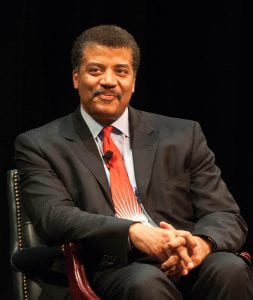Neil DeGrasse Tyson (pictured to the left) is an American astrophysicist who is commonly referred to as a modern popularizer of science. His books, podcasts, and shows have introduced generations to the wonders of science and the cosmos.
Background:
Neil Degrasse Tyson was born on October 5th, 1958, in Manhattan, New York. Dr. Tyson discovered his affinity for space after looking at the moon through binoculars at a young age. When he was 9, he visited the Hayden Planetarium and had his first in-depth experience with the starry sky. However, as he was growing up, Dr. Tyson often said “being smart is not on the list of things that gets you respect.” It was very unusual for an African-American to be interested in anything STEM-related at the time. He recalled that “African-American boys were expected to be athletes, not scholars.”
Accomplishments:
Despite a lack of African American representation in his field, Dr. Tyson continued to chase his dreams. He graduated from the Bronx High School of Science and earned a BA in physics from Harvard. He continued on to earn a Master’s degree from the University of Texas at Austin, and he eventually earned his Ph.D. in Astrophysics from Columbia University. Dr. Tyson worked as an astrophysicist and research scientist at Princeton University and a columnist for StarDate magazine. In 1966, he became the first occupant of the Frederick P. Rose Directorship of the Hayden Planetarium and even founded the department of astrophysics at the museum. In 2001, Dr. Tyson became a member of the Commission on the Future of the United States Aerospace Industry. He served as part of President Bush’s Commission on Implementation of United States Space Exploration Policy two years later. NASA awarded Dr. Tyson with their esteemed Public Service Medal, the highest honor NASA awards to civilians, and The International Astronomical Union even officially named the asteroid “13123 Tyson” after him. Arguably as impressive, (and my personal favorite of his accomplishments), Dr. Tyson was voted “Sexiest Astrophysicist Alive” by People Magazine in 2000.
Entertainment Career:
Dr. Tyson is praised for his ability to translate confusing topics (like astrophysics) into simpler terms and ideas that the average person can comprehend. Some of his most popular books are: One Universe: At Home in the Cosmos, Just Visiting This Planet, Death by Black Hole, and Astrophysics for People in a Hurry. From 2006 to 2011, he was the host of the TV series NOVA ScienceNOW and became the host of the weekly radio show StarTalk in 2009. In 2014, Dr. Tyson hosted the very popular series Cosmos: A Spacetime Odyssey, which was (in his own words) a “continuation” of astronomer Carl Sagan’s Cosmos series in 1980. Dr. Tyson’s Cosmos series is one of the most engaging and interesting shows I have personally watched. I strongly recommend it to anyone who is even slightly interested in space.
Challenges:
As Dr. Tyson has stated himself, “There are very, very few African-American astrophysics PhDs.” While following his personal dreams, he was “doing something people of [his] skin color were not supposed to do.” Neil DeGrasse Tyson, as an astrophysicist, is only one example of the many underrepresented groups of American-Americans in STEM; however, astrophysicists specifically are severely underrepresented. Astrophysicist J.C. Holbrook conducted a study in which she discovered that “since 1955, only forty African-Americans have earned doctorates in astronomy or physics doing an astronomy dissertation. This means they comprise at most 2.47% of PhDs in astronomy. Out of 594 faculty at top 40 astronomy programs, 6 are African-American (1%).” Despite these low numbers, Neil DeGrasse Tyson has taken a step in the STEM field that will hopefully inspire others of minority groups to follow.
Neil Degrasse Tyson has also weighed in on current civil rights issues. In Dr. Tyson’s “Reflections on the Color of My Skin,” he addresses the racial unrest in America in 2020. He tells stories of his colleagues and himself being pulled over, questioned, and followed seemingly for no reason, yet instead of simply stating what is wrong, he offers a list of solutions to the issues facing America today. The first three points argue to “extend police academies to include months of cultural awareness and sensitivity training that also includes how not to use lethal force, test [police officers] for any implicit bias they carry, with established thresholds of acceptance and rejection from the police academy, and during protests, protect property. Protect lives. If you attack nonviolent protesters you are being un-American. And we wouldn’t need draconian curfews if police arrested looters instead of protesters.” Use the hyperlink to see the rest of Dr. Tyson’s well-thought-out suggestions. Dr. Tyson continues to teach the world about science while inspiring others to follow in his footsteps.




Leave a Reply